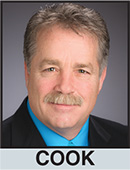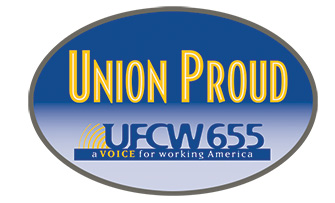The times they are a-changing
 By DAVID A. COOK
By DAVID A. COOK
President
 It has been about two months since we ratified contracts with our two largest employers, Schnucks and Dierbergs, and in that time there has been a great deal of focus on the historic wages we secured and the new benefits we added.
It has been about two months since we ratified contracts with our two largest employers, Schnucks and Dierbergs, and in that time there has been a great deal of focus on the historic wages we secured and the new benefits we added.
There’s one part of the new contract which has gone largely unnoticed since our contract meetings but will soon be front and center for many of our partners.
In this new contract we bargained new language for “flex workers.” These are workers that Schnucks or Dierbergs could hire that would operate almost the way an Uber driver or Instacart shopper operates: choosing their own schedule whenever they are looking for some extra money.
WILL BENEFIT ALL PARTNERS
The key difference is that these flex workers will pay union dues and, as such, be full union partners with all the benefits that comes with it. While this new classification will provide our employers with the ability to have more flexibility in hiring, I am proud to say that this new language in the contract gives our existing partners something we’ve never had before: the ability to maximize hours throughout the Company when shifts become available.
The new flex worker language provides any existing partner with the opportunity to seek out and bid for open shifts at any store they would like, with shifts being awarded based on seniority. Not only will this make it easier for our partners to maximize their hours, but it will also allow you to maintain the hours needed for your desired level of benefits.
READY SOON
This new program is in active development at Schnucks and at Dierbergs, and the entire system will be accessible on your smartphone, giving our partners easy and quick access to company-wide seniority and the ability to maximize hours: a goal we’ve had as long as I can remember, finally achieved.
While the program is not yet up and running, I know Schnucks and Dierbergs are working toward having it off the ground sooner rather than later, and we plan on working with our partners and the companies to make sure it runs as smoothly as possible in accordance with the language in the contract.
WORKPLACE IS CHANGING
The reason I’m writing about this today is because the workplace is changing and changing very fast. I’ve been around long enough to remember many new pieces of technology entering our industry. The digitization of our industry, from manual registers to computers slowly began reshaping our workplaces.
Now, those changes are happening at a blinding pace. Tally, those robots we all know, was introduced barely five years ago and only in a small number of stores. Today, every Schnucks location has a Tally. While self-checkouts peaked their heads into our stores over a decade ago, suddenly they account for a huge chunk of floor space with most stores holding 10 or more at a time.
JOBS CHANGING AS WELL
That’s not all. Automation is reducing the workforce and, therefore, eliminating jobs. The jobs that we do have are changing as well.
The so-called “gig” economy has surged beyond anything that could have been predicted, with millions of Americans now working a second job, or multiple jobs, where they work as they please. Whether it’s driving in a car sharing service, or shopping for groceries, or picking up meals, these gig jobs are a reality and they aren’t going away. Younger workers want flexibility in their jobs and gig workers have it.
So, how do we make sure we are attracting this new workforce and providing the necessary manpower to our employers without sacrificing the things we fight for as a union?
This new flex worker language is the first step. It will help our employers hire workers who aren’t looking for a set schedule and give those workers access to a union contract and benefits — something those other so-called “gig” jobs simply do not offer.
Maybe, just maybe, it’ll show those workers what they are missing. Maybe it’ll help continue the wave of unionization we are seeing across the country when these workers see that flexibility doesn’t have to mean you give up the chance at a quality job.
NOT THE CURE…BUT….
This new language won’t be perfect. When this rolls out, this new program I’m sure there may be issues that will need to be resolved and unforeseen challenges to be met. It’s not the cure to everything that ails the common workplace, but it’s a good start.
This is language that doesn’t exist in retail anywhere in the country, and we are proud of our role in leading the charge into this new world.
Jobs in grocery stores simply do not look the same as they did years ago, but that doesn’t mean that they shouldn’t be good jobs with good pay and quality benefits. As we’re seeing a rising tide of workers, especially workers in retail and food industries, seeking out a better life by forming a union, it’s time to remind the country that all labor is important and valuable, and anyone who works hard deserves to make a good wage.
The evolution of our industry has been a strange one, but we can’t afford to wait on the sidelines. These jobs are changing, and we have to be actively engaged in that process, or we’ll be left behind.


Leave a Reply